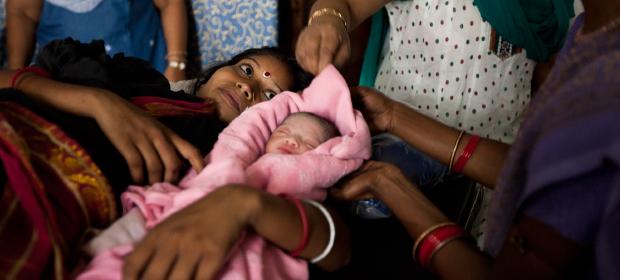Where We Work
See our interactive map


In 2010, an estimated 287,000 women died from complications related to pregnancy and childbirth. Of these deaths, 85% occurred in sub-Saharan Africa and Southern Asia. This represents a global decline of 47% since 1990—but falls disappointingly short of the Millennium Development Goals (MDG) target of 75%.
Last week, I returned from Women Deliver, the largest global meeting of the decade to focus on the health and well-being of girls and women. With just two and a half years left to meet the MDGs, more than 4,500 participants in Kuala Lumpur rallied around the need to accelerate progress to achieve MDG 5: to improve maternal health.
I attended the conference to hear what the international community is saying about the roles health workers play in achieving this global imperative. We know that the presence of a skilled birth attendant at delivery is important to averting maternal mortality and morbidity—whether it’s a doctor, a midwife, or specially trained auxiliary personnel. Skilled attendance at birth is on the rise, but it has only increased by 10% in developing countries over the last 20 years, and sub-Saharan Africa and Southern Asia are lagging behind.
Midwives are priority skilled birth attendants. Over the last five years, the global midwifery community has galvanized around the need to save more women. Midwives had a strong presence in the main Women Deliver program, and the United Nations Population Fund and others hosted a smaller, pre-conference Midwifery Symposium. There is much to celebrate about the progress in expanding midwifery education and practice. Around the world, midwifery schools have enhanced their production capacity and quality, and a growing number of midwifery associations are advocating and setting professional standards for this cadre of health worker.
But there is still much to do to ensure that all health workers can deliver for women. As a champion for health workers, I was especially struck by the growing evidence and recognition that while skilled birth attendants are absolutely critical to recognizing and responding to complications during childbirth, the attitudes and practices of some maternal health workers can be a significant barrier to women’s access to high-quality, dignified care—and this was a hot topic at Women Deliver. IntraHealth’s 2012 assessment conducted with the Government of Ethiopia reinforced this issue, as women and their families shared anecdotes about disrespectful care and outright abuse at health facilities as reasons why they preferred to deliver at home.
A new Respectful Maternity Care Toolkit, developed by the USAID/MCHIP Project, provides an impressive array of field experiences, guidance, tools, training materials, and indicators to help practitioners design effective programs that address problems of abuse and disrespect that can drastically limit women’s desire to use health care services.
My second question was answered, at least in part, by a technical brief presented by the Barcelona-based firm Integrare during one of the high-level plenaries. And unfortunately, the answer is, “Not really.”
Integrare analyzed the commitments declared by national governments as part of the Every Woman, Every Child campaign from a health-workforce perspective. The analysis reveals that of the 74 countries that made commitments, only 47 specified strengthening the health workforce in some way. However, 65 countries made commitments that would require access to skilled, motivated, and supported health workers.
At the same time, the report cites several previous reviews of progress on MDG 5 that point to the shortage of skilled health workers as a “critical barrier to implementation.” The report concludes that although the United Nations, the World Health Organization, and the Partnership for Maternal, Newborn and Child Health have made statements that health workers are key to achieving the MDGs, these statements are not translating into action.
Clearly, there is still need for the global community and all of us to advocate for increased attention, collective action, and resources for health workers, be they clinical officers, midwives, anesthesiologists, or community health workers. Jim Campbell of Integrare summed it up in Malaysia by calling for a UN Commission for Human Resources for Health. Let’s join him and call for similar bold action, because we know that in sufficient numbers and with the right support, health workers can deliver for women.
—Rebecca Kohler
Senior Vice President of Corporate Strategy and Development
Get the latest updates from the blog and eNews




